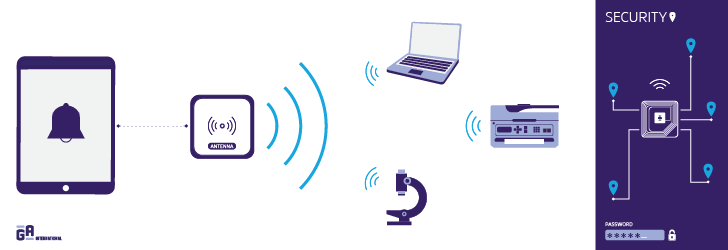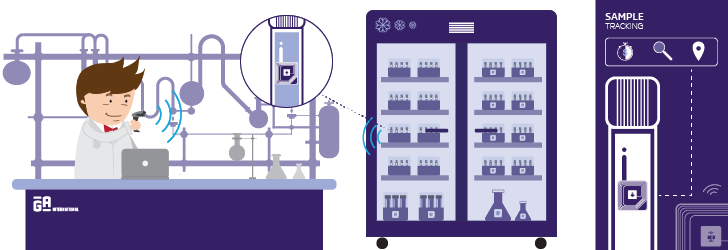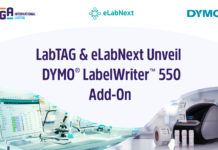 In our previous post we introduced the basics of how Radio-Frequency Identification (RFID) works. We also briefly touched upon the way it might help researchers in the lab. Here we will go more in depth over the many uses for this novel technology, including as RFID labels, in the research environment.
In our previous post we introduced the basics of how Radio-Frequency Identification (RFID) works. We also briefly touched upon the way it might help researchers in the lab. Here we will go more in depth over the many uses for this novel technology, including as RFID labels, in the research environment.
Security
Security is of paramount importance for laboratories. Whether it be a clinical lab handling patient’s blood or tissue samples, or a basic research lab conducting sensitive experiments, privacy and security is essential. In addition to having to safeguard valuable information, labs also often contain hazardous materials and high-value equipment that must be kept safe. As such, access to the lab must be controlled, and even once in the lab practices must be in place to protect sensitive information and valuable materials.
RFID technology can help keep your lab secure, with the use of RFID labels. These innovative labels can be applied to high-value equipment as well as important samples and material. Tagging valuable equipment with RFID labels allows you to keep track of them and will let you know if they are removed from the lab. Furthermore, RFID labels on samples allow you to keep confidential information secret from any non-authorized personnel. As opposed to readable text and even barcodes that can be scanned by anyone with a hand-held scanner, RFID labels can be encrypted to shield the encoded data, ensuring that sensitive information is kept confidential.
Sample Tracking
Asset tracking, or asset management, refers to the tracking of the location, status, maintenance schedule and other important information regarding physical assets. The goal of any laboratory asset tracking system is to ensure asset control efficiency and to minimize loss. This is also of critical importance in the research environment, where hard to replace specimen must be carefully tracked and high-value equipment must be maintained in working order.
In the lab, RFID label technology as designed by LabTAG, can be used to track specimens, lab assets, and equipment. RFID labeling of valuable specimens helps ensure the samples aren’t lost and that they remain clearly and securely identified, with the information being easily accessible. If you’ve ever tried to find a specific sample in a crowded freezer, you know how time-consuming this can be. This usually involves removing each box, one at a time, and checking each individual sample found inside. This can not only cause the samples you check to potentially thaw, compromising their integrity, but it can also increase the temperature of the freezer itself, risking the preservation of all your precious samples. Alternatively, RFID sample tracking will allow you to precisely locate your sample before you ever even open the freezer door. Moreover, identifying lab assets and equipment allows for scheduling of necessary maintenance and service, as well as preventative maintenance, and helps keep track of assets that may have come to the end of their lifecycle, and need to be replaced.
In addition, RFID label technology also has applications in animal environments commonly used by research centers. RFID tags can be placed on the cages used to house animals. These tags can encode the protocol number, animal IDs, treatments done, and drugs administered. These tags also allow automated tracking of the cages in and out of holding rooms.
Inventory Control
A well-managed supply chain with integrated inventory control is an essential component of proper lab management and ensures results, accuracy, and patient safety are not compromised. A great way to manage your inventory is a fully computerized RFID label system, which can track the product from the time it’s stocked in a cabinet, to when it is removed for a procedure. In addition, the ability to encode information onto the RFID chip provides the means to keep track of the quantity used, the supplier, and the expiry date. Linking this data to an automated database will ensure you know exactly what you have in stock, while also simplifying the ordering process, and ensuring supplier information is readily accessible. If you’ve ever begun an experiment just to realize you’re missing a key reagent, you know how frustrating this can be. This can lead to wasted time, supplies, and resources, as well as expensive overnight shipping costs. Additionally, with multiple users in the lab, improper inventory control can also result in over ordering certain reagents, piling up unnecessary costs, and increasing lab waste.
Moreover, the benefits of RFID labeling become even more apparent when undertaking and conducting full inventory stock counts. While for the most part, this exercise continues to be performed manually with the more advanced environments using barcode systems. Nonetheless, both approaches are extremely time-consuming, typically taking several days to complete a full inventory audit. To this end, many laboratory managers are clamoring for a solution that would automate the inventory process and enable them to spend more time conducting experiments.
The implementation of an RFID labeling system provides a much-anticipated solution to alleviate this situation. With RFID readers placed at key points throughout the lab, all inventory, such as reagents, are constantly being tracked, which allows for real-time inventory accounting, ensuring accurate levels.
To this end, it becomes clear that the use of RFID labels provides several advantages not offered by traditional labels, or by barcoding, and that RFID labeling introduces efficiencies of scale benefits:
- Automate the inventory management process by accurately tracking and tracing laboratory equipment, inventory, and samples in ‘real-time’.
- Significant cost savings in replacing lost or degraded samples.
- Dramatic savings in cost overhead incurred through unnecessary inventory levels and price-gouged last-minute shipping charges.
- Highly effective operational efficiencies with more manpower focused on conducting profitable experiments.
Ask us now for a complimentary assessment of how our RFID label technology can cost-effectively improve your laboratory operations for a sustainable and repeatable ROI.
LabTAG by GA International is a leading manufacturer of high-performance specialty labels and a supplier of identification solutions used in research and medical labs as well as healthcare institutions.





